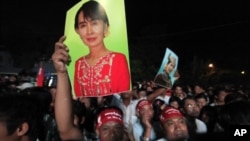Burmese democracy leader Aung San Suu Kyi's 18-month journey from political prisoner to parliamentarian is among the most visible signs of change in her homeland, as the new, nominally-civilian government seeks to repair ties with the West.
The daughter of independence hero Aung San, who was assassinated by political rivals in 1947, Oxford-educated Aung San Suu Kyi first burst onto Burma's political landscape in 1988, when she returned from Britain. She quickly became a central figure in the country's nascent pro-democracy movement, addressing a half million people that year at a mass rally in Rangoon as the military launched a deadly crackdown on dissent.
Burma's parliamentary and by-elections
- 45 seats in the national legislature are being contested.
- 160 candidates from 17 parties and eight independents are running.
- Legislature comprised of 440 seat lower house, 224 seat senate, 14 regional assemblies.
- 25 percent of seats chosen by armed forces commander and reserved for military personnel.
- The Union Solidarity and Development Party (USDP) won 76 percent of the vote in 2010.
- Constitution limits lawmakers' powers.
Months later, as she campaigned, she survived the first of two assassination attempts. She also helped found the National League for Democracy party that year.
Two years later, the junta called a general election that left the NLD in control of 80 percent of parliament. But faced with marginalization, the military refused to relinquish power and Aung San Suu Kyi was placed under house arrest. She was also awarded the 1991 Nobel Peace Prize.
During that period, she remained separated from her children and husband - the latter of whom she saw only five more times before he died of cancer in 1999. In 2003, during a brief period of freedom, she survived a second assassination attempt and was returned to house arrest.
Photo Gallery
Military rule and the arrests of thousands of pro-democracy activists brought enormous pressure from Western governments, which continued to impose a wide-range of economic sanctions. Most remain in place today.




